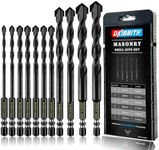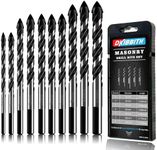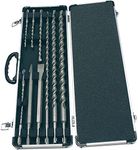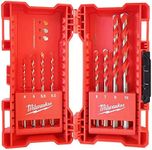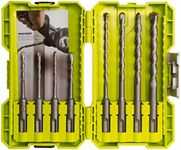Buying Guide for the Best Masonry Drill Bit Sets
Choosing the right masonry drill bit set is crucial for anyone who needs to drill into hard materials like concrete, brick, or stone. The right set will make your work easier, faster, and more efficient. When selecting a masonry drill bit set, there are several key specifications to consider. Understanding these specs will help you make an informed decision and ensure you get the best fit for your needs.MaterialThe material of the drill bit is important because it determines the bit's durability and effectiveness. Masonry drill bits are typically made from carbide-tipped steel, which is very hard and can withstand the high temperatures generated by drilling into tough materials. For heavy-duty use, look for bits with a higher carbide content. If you are a casual user, standard carbide-tipped bits should suffice.
Size RangeThe size range of the drill bits in the set is important because it determines the versatility of the set. Drill bits come in various diameters and lengths. A good set should include a range of sizes to handle different tasks. For general home use, a set with a few common sizes (e.g., 1/8 inch to 1/2 inch) should be adequate. For more specialized or professional work, you might need a set with a wider range of sizes.
Shank TypeThe shank is the part of the drill bit that fits into the drill. Common types include round, hex, and SDS (Slotted Drive System). The type of shank you need depends on your drill. SDS shanks are typically used for heavy-duty rotary hammers and provide better grip and torque. Hex shanks are good for quick changes and are less likely to slip. Round shanks are standard and fit most drills. Choose a set with the shank type that matches your drill.
CoatingSome masonry drill bits come with special coatings that enhance their performance and longevity. Common coatings include titanium and black oxide. Titanium-coated bits are more durable and resistant to heat, making them suitable for heavy-duty use. Black oxide coatings provide some corrosion resistance and are good for general-purpose drilling. If you plan to use the bits frequently or for tough jobs, consider a set with coated bits.
Flute DesignThe flute design refers to the grooves along the drill bit that help remove debris from the hole. A good flute design improves drilling efficiency and prevents the bit from getting stuck. Look for bits with wide, deep flutes for better debris removal. If you are drilling into very hard materials, a more aggressive flute design can help. For general use, standard flutes should be sufficient.
CompatibilityEnsure that the drill bit set you choose is compatible with your drill. Check the manufacturer's recommendations for your drill model. Some sets are designed specifically for certain types of drills, such as rotary hammers or impact drills. Compatibility is crucial for safety and performance, so always double-check before purchasing.


